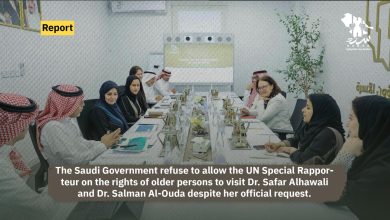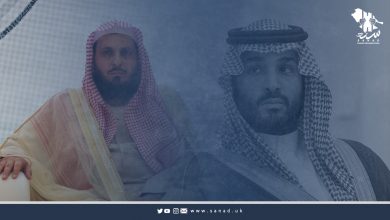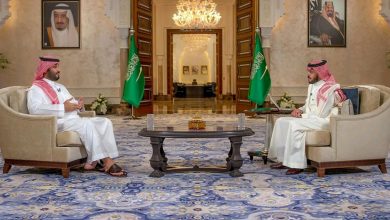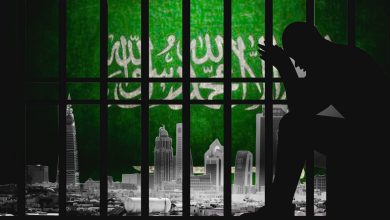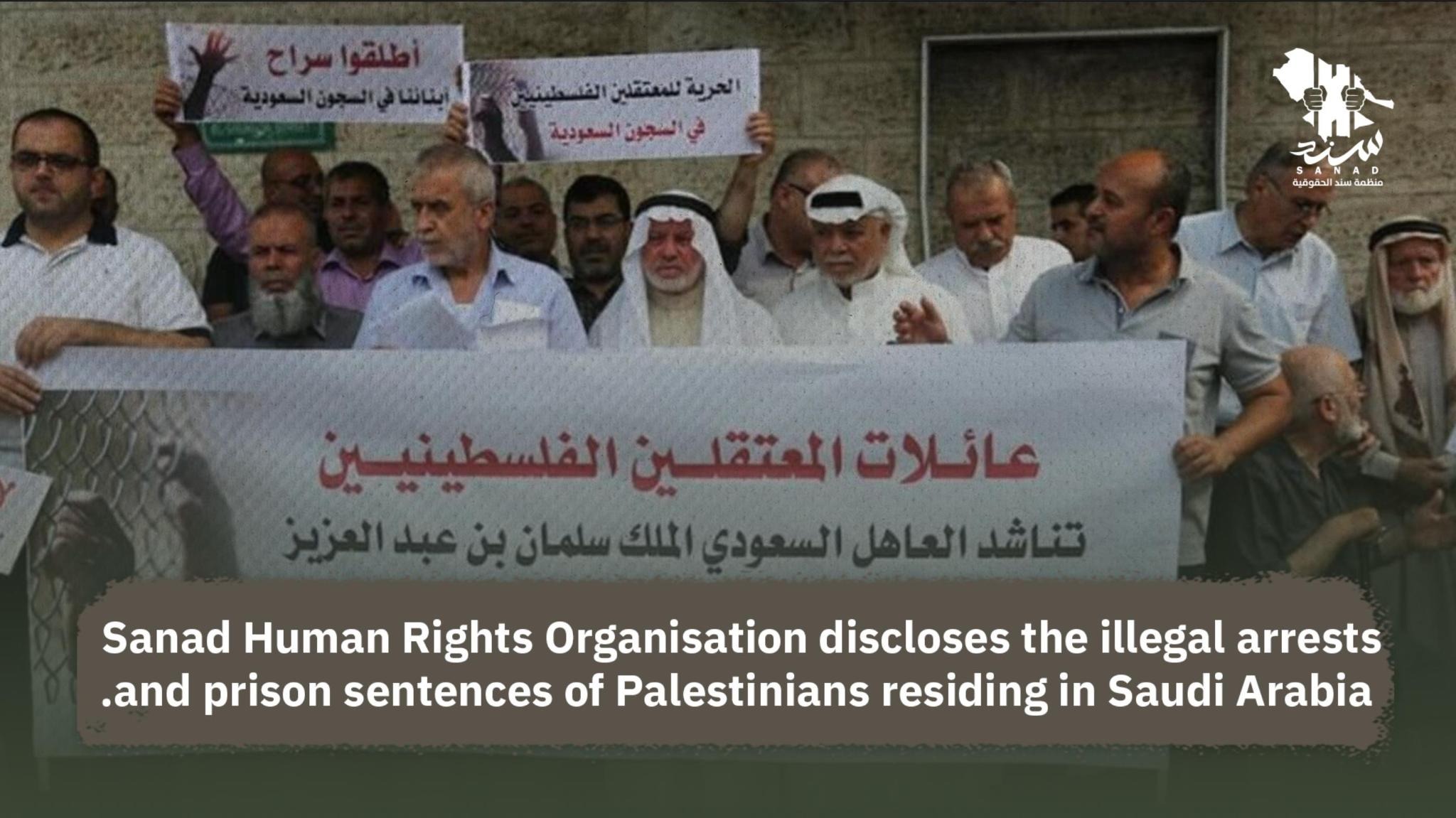
Sanad Human Rights Organisation discloses the illegal arrests and prison sentences of Palestinians residing in Saudi Arabia.
Sanad Human Rights Organisation discloses the illegal arrests and prison sentences of Palestinians residing in Saudi Arabia.
On the basis of documents acquired, Sanad discovered that the Saudi authorities had launched a massive arrest campaign against a number of Palestinian residents in Saudi Arabia. Beginning with the arrest of Dr. Muhammad al-Khudari, an official representative of the Hamas movement in Saudi Arabia, on April 4, 2019, when a security force raided the home of the 83-year-old. They arrested and transported him to an unknown location. Later that day, they forcibly apprehended his son, Dr. Hani, who disappeared for more than six months. Muhammad was released in October 2022 due to international pressure and the fact that he was afflicted with a number of life-threatening illnesses, including cancer.
The arrests of dozens of Palestinians legally residing in Saudi Arabia has persisted since, totalling 69 individuals.
A number of international organisations and Palestinian factions have demanded that the Saudi government release all detainees, emphasising that Saudi Arabia’s continued detention of dozens of Palestinians without charge or guilt is a sin and a legal violation. Riyadh, for its part, has not provided any comment or clarification on the matter, but it has stated that its detainees are being handled by the appropriate tribunals and are enjoying all of their legal rights.
Violations inside prisons:
A number of Palestinian detainees were subjected to serious violations inside prison. This included their transfer from various prisons to “Shaar” Prison,
a facility where Saudi authorities transfer individuals they are seeking to intensify their mistreatment and disregard their medical needs. The prison received Palestinians who were detained under conditions that were deemed to be inhumane and detrimental to their health.
Among the forms of torture they were subjected to, (according to what Sanad documented in a previous report on Shaar Prison) is torture inside pitch black rooms, where detainees are beaten until they lose consiousness, then sprinkled with water only to be beaten up again. Amongst the other methods of torture include leaving the wards illuminated even during bedtime. An eyewitness stated that the prison guards treated the inmates inhumanely, cruelly, and violently, and intentionally abused them both psychologicaly and physicaly.
The Euro-Mediterranean Observatory reported that Palestinian detainees were subjected to torture according to testimonies documented by human rights organisations, and that they are being subjected to many violations and horrible conditions.
The Arab Organisation for Human Rights in Britain explained that most of the detainees had been subjected, over the course of several months, to forced disappearance, degradation, torture, and other forms of brutal and inhuman treatment. Their previous trials had occurred without them even being able to employ solicitors, as the Saudi government prohibited Saudi solicitors from defending them or attending court.
Multiple times, the families of the detainees demonstrated in front of the Saudi Embassy in Amman, Jordan, to demand the release of their detained relatives in Saudi Arabia. They confirmed on March 12, 2020, in their first protest, that “suffering from illness and the constant need for medicine and nutritional supplements makes us constantly concerned for the lives of our detainees”. They added: “We continue to be profoundly concerned about the state of detention in the Kingdom of Saudi Arabia, particularly the ongoing arbitrary detention operations since the start of April 2019 and the grave and ongoing violations against them through detention and torture”. According to the human rights assessment, some of the arrest operations since April 2019 are classified as forced disappearances, while others are arbitrary arrests in violation of international human rights law, particularly the International Covenant on Civil and Political Rights of 1966.
Trials:
The Saudi government initiated trials for a number of Palestinian detainees at the beginning of March 2021, after transferring them to “Shaar” prison in Abha, southwestern Saudi Arabia. However, these trials lack the most fundamental legal procedures, as they are secret and only a small number of detainees were permitted to hiring a lawyer, in addition to unjustified postponement of the sessions. Human Rights Watch has issued a warning that the mass prosecution organised by Saudi authorities against dozens of Palestinian and Jordanian detainees residing on Saudi territory raises grave concerns of legal procedure violations.
The organisation stated that after two years of holding these detainees without charges, covert trials based on vague allegations regarding their ties to an unnamed “terrorist entity” began.
They added that Saudi Arabia’s lengthy history of “unfair trials” raises concerns that detainees will face grave fabricated charges and severe punishments.
Sanad confirms that their arrest was not carried out in accordance with a legal procedure or judicial order. Sanad rejects the physical and psychological torture to which they were subjected during their detention, which was confirmed by numerous human rights organisations and those interested in Saudi human rights affairs. They were subjected to arbitrary arrest, enforced disappearance, solitary confinement, deprivation of communicating with their families and even of hiring a lawyer. In addition to the recent deliberate medical negligence and a absurd trial that lacks the lowest legal standards.
Lawsuits:
Among the official documents acquired by Sanad was evidence that the Saudi judiciary had issued multiple rulings against a number of the detainees. It was evident from these documents that these judgements were based on broad charges that did not constitute convictions, such as:
1- Being accused of belonging to a terrorist organisation. However, in a number of trial sessions, the lawyer asked the public prosecutor to disclose the identity of the terrorist entity mentioned in the case statement. But he declined to identify the entity, citing the significance of the anti-terrorism system. Multiple sessions were dedicated to repeating the query to him. In fact, every entity must have a name and a mission, and the attorney argued that the failure of the Public Prosecutor to identify the entity should result in the dismissal of the charges. The entity mentioned in the report is (the Palestinian Islamic Resistance Movement, Hamas), and the movement is not banned or categorised as a terrorist group in Saudi Arabia, according to the Supreme order No. A/44 dated 4/3/1435, which lists the banned groups and confirms that each entity must have a name or distinguishing characteristic for it to be considered terrorist.
2- The defendants’ confessions during the investigation, upon which the Public Prosecution based the accusation, are nothing more than transmitted statements. There is no material evidence to support a significant number of axcusations, and the accused did not acknowledge them either.
3- Accusation of distributing videos and images of the Palestinian resistance, as well as carrying Hamas slogans.
4- Accusations of possessing Tariq Al-Suwaidan’s “The Illustrated History of Palestine”, books by Dr. Al-Qaradawi, and maps of the city of Palestine.
According to the documents obtained by Sanad, the following is a breakdown of these sentences:
1- Muhammad Ahmed Hassan Al-Abed: an electrical engineer born in 1957 who was arrested in Jeddah in February 2019. He was sentenced to 22 years in prison (release halfway through his sentence), in addition to being deported from the country at the end of his period.
2- Muhammad Al-Banna: a financial director born in 1969 who was arrested in Jeddah in February 2019. He was sentenced to 20 years in prison, in addition to being deported from the country at the end of his period.
3-Jamal Khader Al-Dahoudi: an entrepreneur who was arrested in February 2019 in Jeddah. He was sentenced to 15 years in prison, in addition to being deported from the country at the end of his period.
4- Saado Khalil Al-Sahar: a marketing manager who was arrested in Jeddah in February 2019. He was sentenced to 18 years in prison, in addition to being deported from the country at the end of his period.
5- Maher Shaaban Al-Halman: an accountant born in 1969 who was arrested in Jeddah in 2018. He was sentenced to 6 years in prison, in addition to being deported from the country at the end of his period.
6- Mahmoud Ghazal: an accountant born in 1953 who was arrested in Jeddah in 2018. He was sentenced to 12 years in prison (release halfway through his sentence), in addition to being deported from the country at the end of his period.
7- Ayman Al-Erian: born in 1975 who was arrested in February 2019. He was sentenced to 19 years in prison, in addition to being deported from the country at the end of his period.
8- Hamza Dweik: born in 1983 who was arrested in Jeddah in March 2019. He was sentenced to 12 years in prison, in addition to being deported from the country at the end of his period.
9- Sharif Muhammad Ibrahim Nasrallah: born in 1956 who was arrested in Jeddah in February 2019. He was sentenced to 16 years in prison (release halfway through his sentence), in addition to being deported from the country at the end of his period.
10- Mashhour Abdul Rahim Al-Sadda: who was arrested in Jeddah in March 2019. He was sentenced to 11 years in prison (release halfway through his sentence), in addition to being deported from the country at the end of his period.
11- Jamal Khaled Omar: born in 1967 who was arrested in Jeddah in April 2019. He was sentenced to 3 years in prison, in addition to being deported from the country after the end of the period.
12- Bassem Kurdi: who was arrested in Jeddah in April 2019. He was sentenced to 7 years in prison, in addition to being deported from the country after the end of the period.
13- Ayman Ghazal: a sales representative born in 1971 who was arrested in Jeddah in April 2019. He was sentenced to 4 years in prison, in addition to being deported from the country after the end of the period.
14- Hamza Samir Abu Al-Khair: a civil engineer who was arrested in Jeddah in April 2019. He was sentenced to 4 years in prison, in addition to being deported from the country after the end of the period.
15- Saleh Hisham Saleh Qafah: a telecommunications engineer born in 1984 who was arrested in February 2019 in Jeddah. He was sentenced to 5 years in prison, in addition to being deported from the country after the end of the period.
16- Samir Rabhi Muhammad Bashnaq: a civil engineer who was arrested in Jeddah in April 2019. He was sentenced to 15 years in prison (release halfway through his sentence), in addition to being deported from the country after the end of the period.
17- Tariq Muhammad Abbas: who was arrested in Jeddah in April 2019. He was sentenced to 3 years in prison, in addition to being deported from the country after the end of the period.
18- Ahmed Arif Nasri Abu Jabal: who was arrested in Riyadh in April 2019. He was sentenced to 9 years in prison, in addition to being deported from the country after the end of the period.
19- Muhammad Khair Hassan Abu Al-Rub: Born in 1962 who was arrested in Dammam in April 2019. He was sentenced to 8 years in prison (release halfway through his sentence) in addition to being deported from the country after the end of the period.
20- Basil Mustafa Youssef Sabah: born in 1978 who was arrested in April 2019. He was sentenced to 10 years in prison, in addition to being deported from the country after the end of the period.
21- Muhammad Suleiman Muhammad Abu Rawaa: born in 1971 who was arrested in Riyadh in April 2019. He was sentenced to 7 years in prison, in addition to being deported from the country after the end of the period.
22- Muhammad Kamel Abdul Rahman Al-Fatafta: born in 1963 who was arrested in Riyadh in April 2019. He was sentenced to 6 months in prison and deported.
23- Ali Nasser Yaqoub Al-Shwaiki: born in 1988 who was arrested in Riyadh in April 2019, and sentenced to 12 years in prison, in addition to being deported from the country after the end of the period.
24- Amin Abdul Hafiz Abdul Khaleq Al-Assar: who was arrested from Riyadh in March 2019. He was sentenced to 6 years in prison, in addition to being deported from the country after the end of the period.
25- Musa Muhammad Musa Abu Hussein: born in 1986 who was arrested in Riyadh in March 2019. He was sentenced to 4 years in prison, in addition to being deported from the country after the end of the period.
26- Muhammad Ali Salama Abu Zaitoun: who was arrested in Abha in April 2019. He was sentenced to 9 years in prison, in addition to being deported from the country after the end of the period.
27- Nabil Jamil Abdullah Safi: who was arrested in Abha in February 2019. He was sentenced to 18 years in prison (release halfway through his sentence) and a fine of 300,000 Saudi Riyals, in addition to being deported from the country after the end of the period.
28- Tariq Jawdat Muhammad Al-Sawafiri: who was arrested in Jeddah in April 2019. He was sentenced to 3 years in prison, in addition to being deported from the country after the end of the period.
29- Adel Noman Saeed Al-Nimr: who was arrested in April 2019. He was sentenced to 3 years in prison, in addition to being deported from the country after the end of the period.
30- Muhammad Hassan Mahmoud Ashour: who was arrested in Jeddah in April 2019. He was sentenced to 4 years in prison, in addition to being deported from the country after the end of the period.
31- Muhammad Saleh Abdullah Qafah: who was arrested in Jeddah in April 2019. He was sentenced to 8 years in prison, in addition to being deported from the country after the end of the period.
32- Omar Arif Al-Hajj: who was arrested in April 2019. He was sentenced to 8 years in prison, in addition to being deported from the country after the end of the period.
33- Arafat Ahmed Hussein Samra: who was arrested in Jeddah in April 2019. He was sentenced to 10 years in prison, in addition to being deported from the country after the end of the period.
34- Yacoub Muhammad Ahmed Shaheen: who was arrested in Jeddah in April 2019. He was sentenced to 3 years in prison, in addition to being deported from the country after the end of the period.
35- Essam Muhammad Omran Al-Sharif: who was arrested in Jeddah in April 2019. He was sentenced to 10 years in prison, in addition to being deported from the country after the end of the period.
36- Fawzi Sobhi Salem Al-Lulu: who was arrested in Jeddah in February 2019. He was sentenced to 8 years in prison, (exemption for a period of 3 years) and a fine of 50,000 Saudi Riyals, in addition to being deported from the country after the end of the period.
37- Subhi Fawzi Subhi Al-Lulu: who was arrested from Jeddah in February 2019. He was sentenced to 15 years in prison, in addition to being deported from the country after the end of the period.
38- Abdul Rahman Muhammad Farhana: who was arrested from Jeddah in February 2019. He was sentenced to 19 years in prison (release halfway through his sentence), in addition to being deported from the country after the end of the period.
Despite the fact that a number of detainees’ guilt has not been established, the Saudi authorities have not released them, and the following names continue to be held arbitrarily.
1- Adham Ghazal: a marketing manager born in 1971. He was arrested in April 2019.
2- Abdulkarim Fathi Abdulkarim Al-Maali: he was arrested in Jeddah in April 2019.
3- Muhammad Mahmoud Ahmed Asaad: he was arrested in Riyadh in April 2019.
4- Badr Saeed Ismail Salti: he was arrested in Jeddah in April 2019.
5- Hani Suleiman Qadeeh: he was arrested in Jeddah in April 2019.
6- Yousef Hamdi Al-Halis: he was arrested in Jeddah in April 2019.
7- Abdullah Rashid Ismail Ismail: he was arrested in Jeddah in April 2019.
8- Abu Bakr Mahmoud Al-Abd: he was arrested in Riyadh in April 2019.
To conclude, despite the fact that these rulings are based on false charges and that the trial procedures were illegal, the Saudi authorities did not follow them and continue to hold a number of detainees even though they have not been convicted and their innocence has been proven by the court. In addition, the sentences of a number of those convicted have expired, and Saudi law requires their release. Nonetheless, the current Saudi government continues to hold them. Sanad Human Rights Organisation, for its part, demands the immediate release of all detainees, without any restrictions or conditions.


